There is no doubt that the COVID-19 pandemic has been stressful for families everywhere in the United States, including Colorado! There are concerns about social and economic disruptions resulting from school closures, home schooling, social distancing, and business closures and accompanying job losses. Although children appear to be less at risk of getting seriously ill from COVID-19, there is also fear and anxiety about the disease itself, both for children and their concerned parents. Mental health care is very important for children and adolescents (and never more so than now during COVID-19) as most mental health disorders begin in childhood. As your integrative pediatrician in the Mile High City, PIP does its very best to provide the highest quality pediatric care for your children, including a focus on your child’s mental and emotional health during this difficult time of the pandemic. We are proud to practice integrative medicine, which focuses not just on conventional medicine, but also includes complementary and alternative methods of supporting your family’s total well-being, including managing stress.
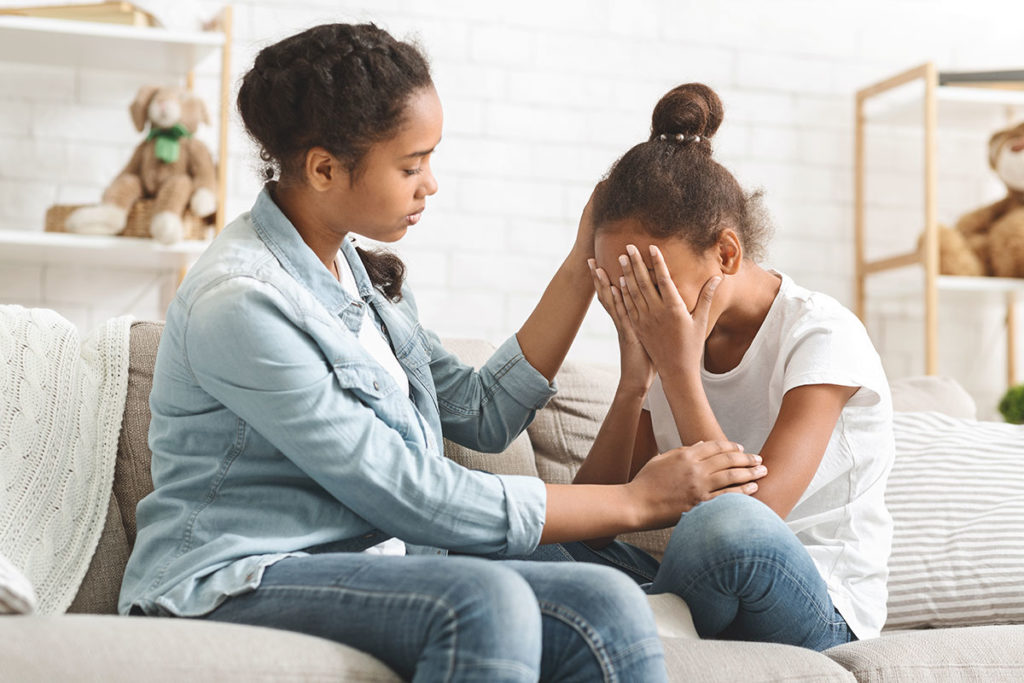
What Are the Signs of Stress?
Even before the pandemic, you have probably had to deal with managing at least some stress in your child’s life. You have probably all heard of the “fight or flight” response to stress, which was originally intended to provide individuals with an extra burst of strength and energy to defend themselves or to flee from danger. Although this response can be beneficial during a short period of stress, it can prove detrimental over a prolonged period of stress such as we are all experiencing with the COVID-19 pandemic. In a chronic stress situation, individuals may experience tension headaches, increased stomach acid secretion and abdominal pain, moodiness and depression. There is also striking evidence that the cells of the immune system function abnormally in persons experiencing chronic stress.
Specifically in the context of COVID-19, the Centers for Disease Control and Prevention (CDC) suggests looking for these common stress-related changes in children and teens:
- Excessive crying or irritation in younger children,
- A return to behaviors your child has outgrown (such as toileting accidents or bedwetting),
- Excessive worry or sadness,
- Unhealthy eating or sleeping habits,
- Irritability and “acting out” behaviors in teens,
- Poor school performance or avoiding school,
- Difficulty with attention and concentration,
- Avoidance of activities enjoyed in the past,
- Unexplained headaches or body pain, and
- Use of alcohol, tobacco, or other drugs.
Remember that not all children and teens respond to stress in the same way! If you are uncertain whether your child’s symptoms are due to stress, you are welcome to reach out to us for input and an assessment. PIP is now offering telehealth visits, which can be followed up with an in-office visit, if necessary.
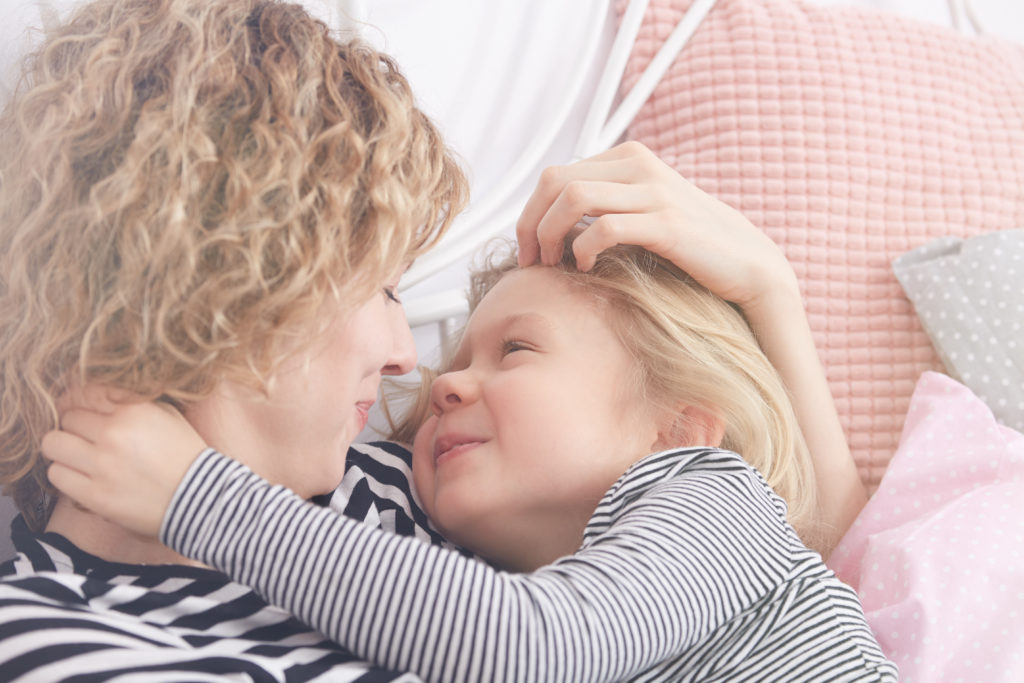
Tips for Supporting Your Child’s Mental Health
The CDC and American Academy of Pediatrics (AAP) have offered these tips for supporting your child, whatever their age, during this challenging time:
- Talk with your child in a calm and factual manner about the COVID-19 outbreak. Answer questions and share facts in a way that your child can understand, and be sure to correct any misinformation that you hear. It is okay to say that people are getting sick, but emphasize that following rules like hand washing, not touching your face and staying at home will help your family to stay healthy. Talk to your child about the importance of social distancing to help slow the spread of the virus and protect persons most at risk.
- Reassure your child that they are safe. Let them know it is okay if they feel upset. (Calmly say, for example, “I can see that you are upset because you can’t have your friends over” or, for younger kids, “What makes you sad?” or “What would you wish for?”) Ask guiding questions (such as “How do you think you can stay in touch with your friends, even if you can’t hang out together?”) to help older children and teens work through issues. Resist the temptation to solve your teen’s problems for them. Teens need practice in decision-making and creating strategies for handling conflicts, and also need the confidence gained when parents help support and validate those solutions. Be an empathetic and attentive listener!
- Share how you deal with your own stress and feelings so that your kids can learn how to cope from you. Let them know that talking about their stress and feelings can lead to a sense of relief once it is “out in the open.”
- Share extra hugs with your child, and say “I love you” more often!
- Limit your family’s exposure to COVID-19 news coverage, including on social media. Children may misinterpret what they hear and can be frightened about something they do not understand. Be careful also to limit exposure to violent and/or inappropriate television, movies and videos.
- As appropriate, allow your child to stay connected to friends and loved ones during social distancing by phone, text, video chat, or social media. (Remind them to check their privacy settings so they are not posting too much personal information online.) Children may worry about a grandparent who is living alone or a relative or friend with an increased risk of getting COVID-19, and video chats can help ease their anxiety. Playing games online with friends and family members can also be relaxing and enjoyable for your child.
- Try to keep up with regular routines. With schools closed, create a schedule for learning activities and relaxing or fun activities. Break up schoolwork when possible. Older children and teens can help with schedules, but they should follow a general order, such as wake-up routines, getting dressed, breakfast and some active play in the morning, followed by quiet play and snack to transition into schoolwork; lunch, chores, exercise, some online social time with friends, and then homework in the afternoon; and family time & reading before bed.
- Talk with your child before you leave the house for work or essential errands. In a calm and reassuring voice, tell them where you are going, how long you will be gone, when you will return, and that you are taking steps to stay safe.
- Tell your child that scientists are working hard to figure out how to help people who get ill, and that things will get better. Help your child, and particularly your teen, look forward by helping them shift away from what has or may have been lost and identify ways to move on with or shift plans and goals.
- Dinner is a good time to gather the whole family together, and it serves as a transition time between the “school day” and the evening. Try fun conversation starters such as, “My favorite part of today was…” or “Today I am grateful for…”.
- Help your kids keep their usual bedtime routine. Bedtimes can shift some for older children and teens, but it is a good idea to keep it in a reasonable range so the sleep-wake cycle isn’t thrown off. Too little sleep makes it more challenging to learn and to deal with emotions. Remember to turn off all cell phones and other mobile devices an hour before bedtime.
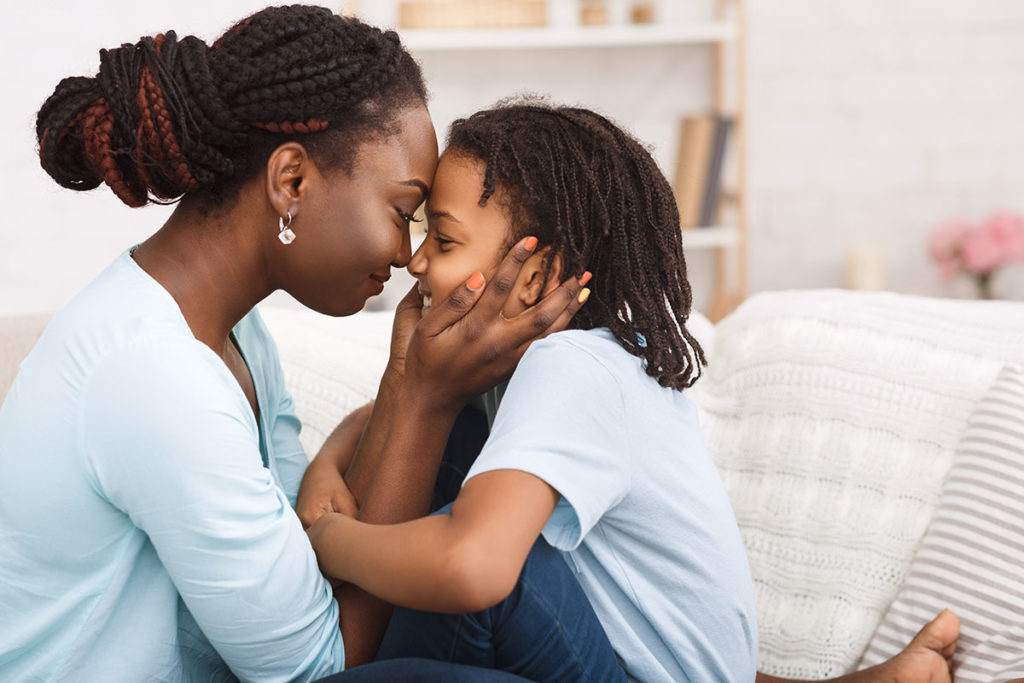
- Even with everyone home together, set aside some special time with each child. You can choose the time, but let your child choose the activity. Just 10 or 20 minutes of your undivided attention, even if only once every few days, will mean a lot to your child. Try to keep cell phones, TV and car radios off or on silent so you don’t get distracted during this special one-on-one time!
- Encourage your child to play outdoors—it’s great for both physical and mental health! Take a walk with your child or go on a bike ride. You can also use indoor activity breaks (like stretch breaks or dance breaks) throughout the day to help your child stay healthy and focused. Even a period of as little as 20 minutes of exercise can lead to the release of endorphins that promote a feeling of well-being.
- Allow your child to have some “down time,” particularly your teen. It’s normal for teens to crave more privacy from their family, and it is best to at times allow them space for some quiet time, creative time, music time, or to virtually hang out with friends.
- Be a role model for your child by getting plenty of sleep, exercising and eating well. Be sure to connect with your own friends and family members, and find ways to decompress and take breaks. If more than one parent is home, you can take turns watching the children, if possible.
- Occasionally stress can be tougher to handle, and that may even be amplified in this unprecedented time of COVID-19. If you believe your child may need extra support, please contact us. If we think counseling may be helpful, we can work with you to refer your child to an appropriate and experienced child therapist.
Tips for Disciplining in a Positive Manner
There is no doubt that everyone is more anxious and worried during the pandemic! Younger children may be more likely to act out their stress and fears, and older children and teens may be more irritable as they miss out on time with friends and special events, such as prom and graduation ceremonies, are canceled. The AAP has come up with some tips for helping potentially frazzled parents manage their children’s emotions and behavior during this trying time:
- Redirect bad behavior. Your child may be misbehaving because they are bored or don’t know any better. In that case, find something else for them to do!
- Creative play. Suggest creative ways for your child to address their fears or concerns through play. For example, you could suggest your child draw a picture of ways your family is staying safe, and then make a collage and hang it up to remind everyone. Or you could ask a younger child to draw a picture about their day and then ask them about it.
- Direct your attention. Use your attention to reinforce good behaviors and discourage others. For example, you can notice good behavior and point it out, praising success and good tries. Particularly with older children, explaining clear expectations can help.
- Use rewards & privileges to reinforce good behaviors (completing school assignments, chores, getting along with siblings, etc.), even if you wouldn’t necessarily give them during less stressful times.
- Use time-outs. Warn your child they will get a time-out if they don’t stop inappropriate behavior. Remind them what they did wrong in as few words and as calmly as possible, and then remove them from the situation for a pre-set length of time. One minute per year of age is a good guideline.
- Avoid physical punishment. Spanking, hitting, and other forms of physical or “corporal” punishment risk injury and aren’t effective. Not only can physical punishment increase aggression in children over time, but it fails to teach them to behave or practice self-control and can even interfere with normal brain development. Corporal punishment may also diminish a child’s sense of safety and security at home, which is crucial at all times, but perhaps especially important during the COVID-19 pandemic!
The AAP recommends that parents feeling overwhelmed or especially stressed take a moment to ask themselves: 1) Does the problem represent an immediate danger?; 2) How will I feel about this problem tomorrow? and 3) Is this situation permanent? In many cases, the answers may help to defuse any frustration or anger a parent may be feeling.
Integrated Therapies for Dealing with Stress
As your favorite Denver metro area holistic pediatrician, we do our best to combine complementary and alternative therapies with conventional medicine in our quest to provide your family with the highest quality pediatric care. When dealing with the topic of stress relief, integrative therapies we recommend include:
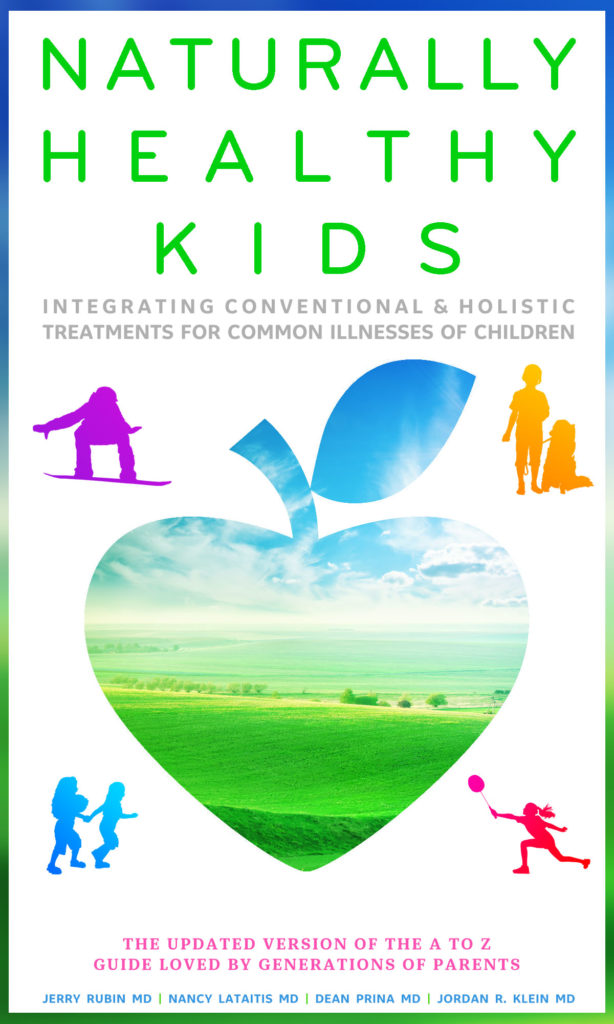
- Aromatherapy: Essential oils, lavender, mandarin, and Roman chamomile can help decrease stress and promote relaxation. Add the oils to bathwater or dab them onto “pulse points” beneath the angle of the jaw or on the temples of the forehead.
- Herbal Remedies: Valerian root may aid in easing a child to sleep.
- Bach Flower Remedies: Rescue Remedy (a homeopathic remedy) may be quite helpful if your child is uncomfortable from stress or anxiety. To calm restlessness, use 2 -4 drops every 10 minutes to every few hours, as needed. A lukewarm bath with 10 drops of Rescue Remedy added is also often effective for relieving stress, in general.
- Massage: If your child has a headache, teach them to massage their forehead with their fingertips, using firm, circular motions. This massage can be done anywhere, at the FIRST sign of a headache. You can also massage your child’s feet or back using the oils, mentioned above, to enhance relaxation.
- Nutrition: Not surprisingly, it is helpful to limit fast food consumption (most of which is high in fat, sodium, sugar and calories and lower in nutrition), as well as caffeine and refined sugars (which can send kids on a virtual “emotional roller coaster”). Plan and encourage the consumption of regular healthy meals and snacks. Cooking together as a family is a wonderful way to share cooking skills, create enthusiasm and leads to much greater success in seeing your kids actually eat the healthier foods! Be sure to add a multivitamin to help assure that daily requirements are met, and encourage hydration with water on a regular basis!
The above remedies are taken from the “Stress: Its Impact” section of our Naturally Healthy Kids handbook, which is available as an eBook on Amazon. Please refer to the “Administering Integrated Treatments section of Naturally Healthy Kids for guidance on using any of the referenced therapies or feel free to contact us with any questions.
We hope the above suggestions, using a holistic approach, help you and your family get through not only the pandemic, but any stressful times. Remember, stay calm and stay safe!
Check out our Naturally Healthy Kids eBook on Amazon!
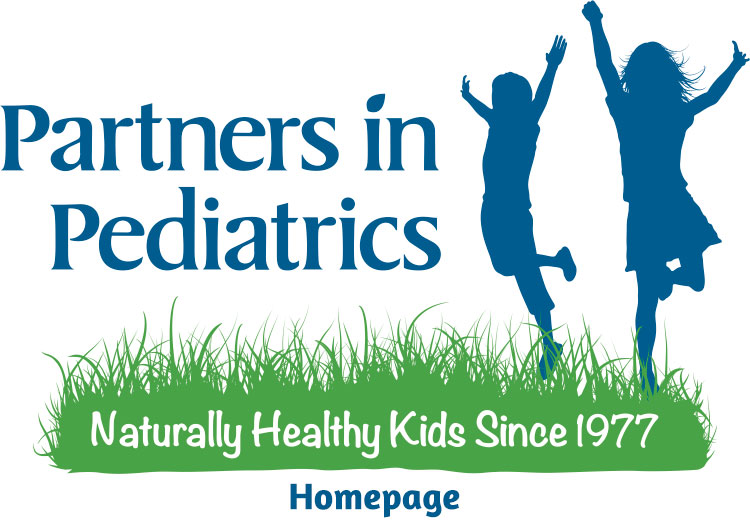


Leave a Reply